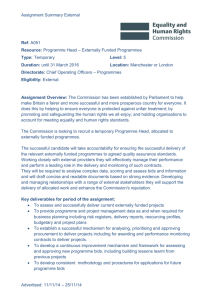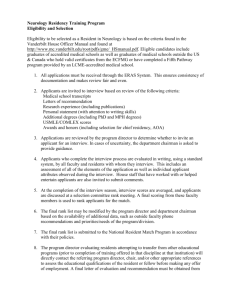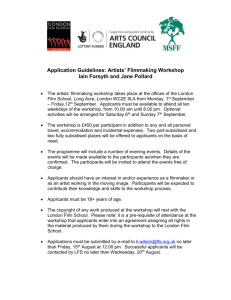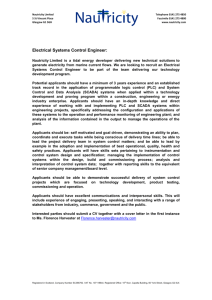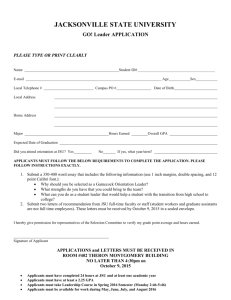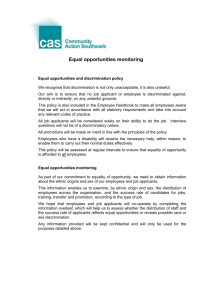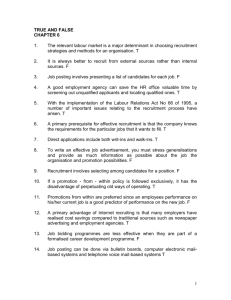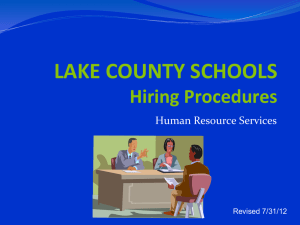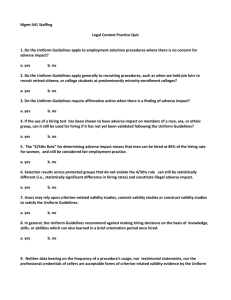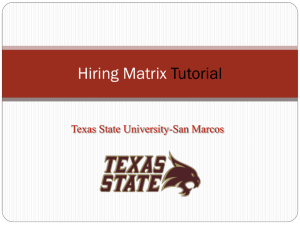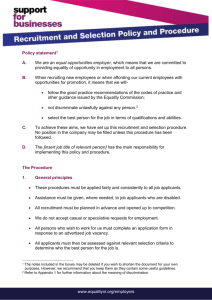The Preliminary Interview
advertisement
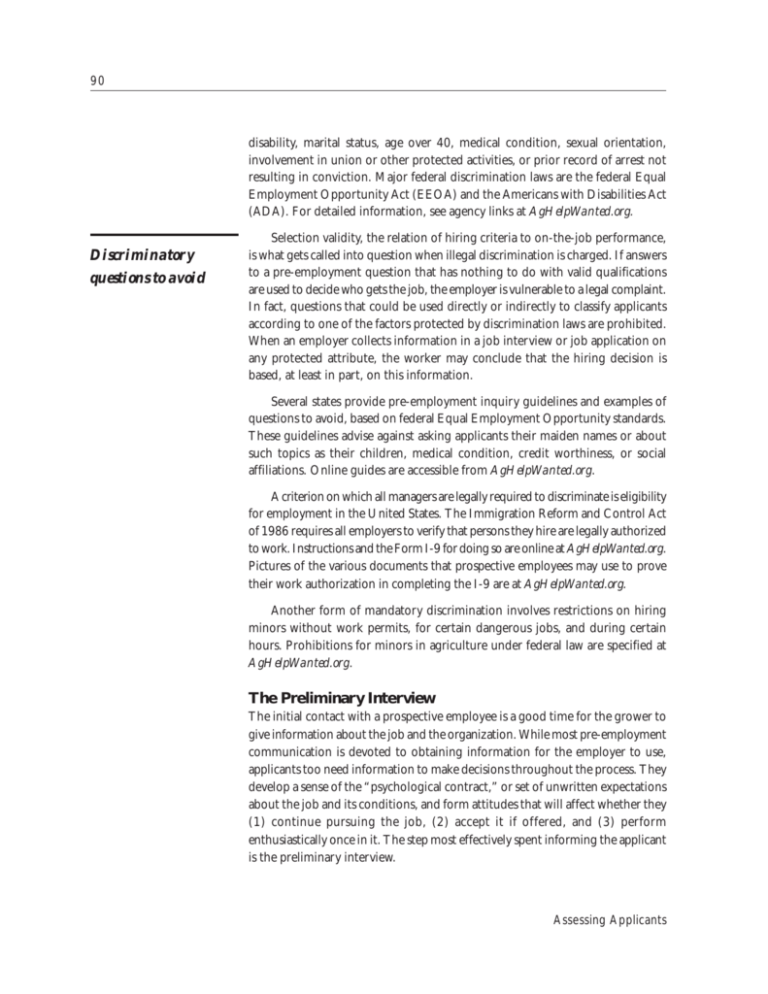
90 disability, marital status, age over 40, medical condition, sexual orientation, involvement in union or other protected activities, or prior record of arrest not resulting in conviction. Major federal discrimination laws are the federal Equal Employment Opportunity Act (EEOA) and the Americans with Disabilities Act (ADA). For detailed information, see agency links at AgHelpWanted.org. Discriminatory questions to avoid Selection validity, the relation of hiring criteria to on-the-job performance, is what gets called into question when illegal discrimination is charged. If answers to a pre-employment question that has nothing to do with valid qualifications are used to decide who gets the job, the employer is vulnerable to a legal complaint. In fact, questions that could be used directly or indirectly to classify applicants according to one of the factors protected by discrimination laws are prohibited. When an employer collects information in a job interview or job application on any protected attribute, the worker may conclude that the hiring decision is based, at least in part, on this information. Several states provide pre-employment inquiry guidelines and examples of questions to avoid, based on federal Equal Employment Opportunity standards. These guidelines advise against asking applicants their maiden names or about such topics as their children, medical condition, credit worthiness, or social affiliations. Online guides are accessible from AgHelpWanted.org. A criterion on which all managers are legally required to discriminate is eligibility for employment in the United States. The Immigration Reform and Control Act of 1986 requires all employers to verify that persons they hire are legally authorized to work. Instructions and the Form I-9 for doing so are online at AgHelpWanted.org. Pictures of the various documents that prospective employees may use to prove their work authorization in completing the I-9 are at AgHelpWanted.org. Another form of mandatory discrimination involves restrictions on hiring minors without work permits, for certain dangerous jobs, and during certain hours. Prohibitions for minors in agriculture under federal law are specified at AgHelpWanted.org. The Preliminary Interview The initial contact with a prospective employee is a good time for the grower to give information about the job and the organization. While most pre-employment communication is devoted to obtaining information for the employer to use, applicants too need information to make decisions throughout the process. They develop a sense of the “psychological contract,” or set of unwritten expectations about the job and its conditions, and form attitudes that will affect whether they (1) continue pursuing the job, (2) accept it if offered, and (3) perform enthusiastically once in it. The step most effectively spent informing the applicant is the preliminary interview. Assessing Applicants Chapter 3: Staffing the Farm Business Misinformation or misinterpretations about the job can be minimized through good communication at this early stage. Some employers who want to get it straight from the beginning offer applicants a written job description. Some supplement the description with other written information about the company and its terms of employment. Others communicate solely through personal discussion. A “realistic job preview” that describes pleasurable, as well as problematic, aspects of the job encourages many an unsuitable candidate to self-select out of the running. If the job requires long hours under a hot sun, endless repetitions of the same operation, fending off corny jokes from Cousin Louie, heavy lifting, tolerance of a surly supervisor, strict punctuality, or concentration amidst deafening moos, why not let the applicant know it right up front? You may lose a few applicants, but you also will prevent much early turnover caused by disillusionment and reality shock. Similarly, using the preliminary interview to inform applicants about the balance of the selection process often saves the employer from considering further some of the unqualified candidates. In typical cases, applicants withdraw after merely being told that a performance test and reference check will be used to confirm their statements on a written application form. Written Applications and Resumes Next to the interview, the written form is the most commonly used selection tool. Both application forms and resumes can efficiently deliver large amounts of relevant information about workers cheaply and in reasonably comparable form. Work experience, education, training, and personal characteristics usually are included. An application form to be completed at the office can serve as an elementary test of literacy and ability to follow instructions. Written biographical data may raise specific points to be explored in a subsequent interview. The employer can ask specific questions about job history on an application form to get an idea of whether and when the person has worked in similar operations before and to help gauge how much training the worker would need if hired. To help assess familiarity with the language of commodity production, the application might ask workers to describe the kind of work they have done or positions held. Many application forms ask for information of little job relevance and dubious legality. While standardized or commercially available forms may seem useful, generally they both contain some irrelevant items and omit information that is pertinent. Laws, court rulings, and administrative guidelines have challenged the job relatedness of items that used to be part of most application forms. Farm operators are well advised to either develop their own forms from scratch or carefully tailor standard ones. Assessing Applicants 91


